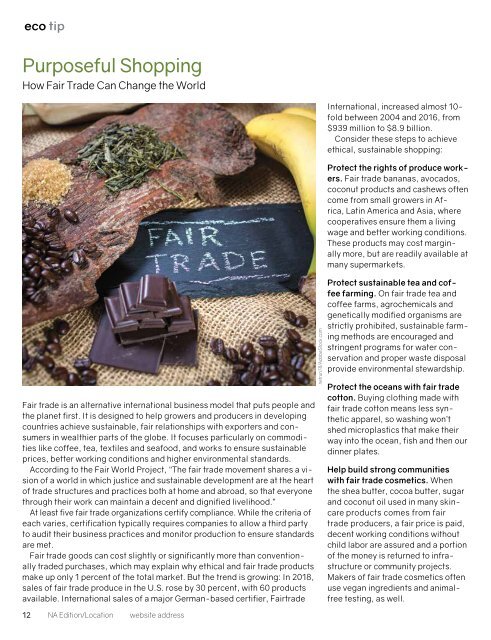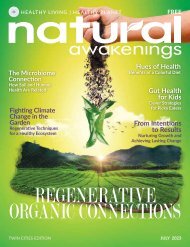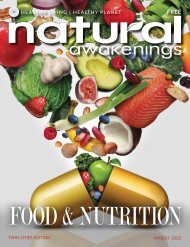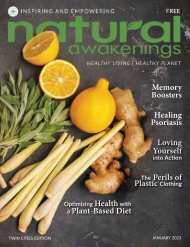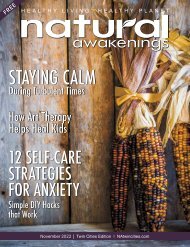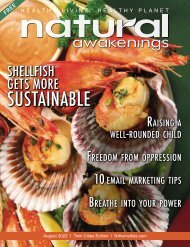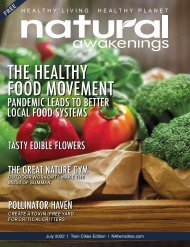Natural Awakenings Twin Cities February 2022
Read the February 2022 edition of Natural Awakenings Twin Cities magazine. This is our annual Heart-Centered Living Issue which is focused on minding the heart and heart and mind connection. This month we feature articles on living on the frequency of love, truly making love, sound of your heart determines your health, fermenting for foodies, parents as role models and so much more! Be sure to check out our local content including News Briefs announcements, Community Resource Guide with providers throughout the metro who can meet your individual wellness needs, and all the happenings in the Calendar of Events. There is additional online-only content that can be found at NATwinCities.com. While you are there, be sure to sign up for our Newsletter and Digital Magazine and continue your reading with our archived articles from local experts.
Read the February 2022 edition of Natural Awakenings Twin Cities magazine. This is our annual Heart-Centered Living Issue which is focused on minding the heart and heart and mind connection. This month we feature articles on living on the frequency of love, truly making love, sound of your heart determines your health, fermenting for foodies, parents as role models and so much more!
Be sure to check out our local content including News Briefs announcements, Community Resource Guide with providers throughout the metro who can meet your individual wellness needs, and all the happenings in the Calendar of Events. There is additional online-only content that can be found at NATwinCities.com.
While you are there, be sure to sign up for our Newsletter and Digital Magazine and continue your reading with our archived articles from local experts.
You also want an ePaper? Increase the reach of your titles
YUMPU automatically turns print PDFs into web optimized ePapers that Google loves.
eco tip<br />
Purposeful Shopping<br />
How Fair Trade Can Change the World<br />
Fair trade is an alternative international business model that puts people and<br />
the planet first. It is designed to help growers and producers in developing<br />
countries achieve sustainable, fair relationships with exporters and consumers<br />
in wealthier parts of the globe. It focuses particularly on commodities<br />
like coffee, tea, textiles and seafood, and works to ensure sustainable<br />
prices, better working conditions and higher environmental standards.<br />
According to the Fair World Project, “The fair trade movement shares a vision<br />
of a world in which justice and sustainable development are at the heart<br />
of trade structures and practices both at home and abroad, so that everyone<br />
through their work can maintain a decent and dignified livelihood.”<br />
At least five fair trade organizations certify compliance. While the criteria of<br />
each varies, certification typically requires companies to allow a third party<br />
to audit their business practices and monitor production to ensure standards<br />
are met.<br />
Fair trade goods can cost slightly or significantly more than conventionally<br />
traded purchases, which may explain why ethical and fair trade products<br />
make up only 1 percent of the total market. But the trend is growing: In 2018,<br />
sales of fair trade produce in the U.S. rose by 30 percent, with 60 products<br />
available. International sales of a major German-based certifier, Fairtrade<br />
12 NA Edition/Location website address<br />
netrun78/AdobeStock.com<br />
International, increased almost 10-<br />
fold between 2004 and 2016, from<br />
$939 million to $8.9 billion.<br />
Consider these steps to achieve<br />
ethical, sustainable shopping:<br />
Protect the rights of produce workers.<br />
Fair trade bananas, avocados,<br />
coconut products and cashews often<br />
come from small growers in Africa,<br />
Latin America and Asia, where<br />
cooperatives ensure them a living<br />
wage and better working conditions.<br />
These products may cost marginally<br />
more, but are readily available at<br />
many supermarkets.<br />
Protect sustainable tea and coffee<br />
farming. On fair trade tea and<br />
coffee farms, agrochemicals and<br />
genetically modified organisms are<br />
strictly prohibited, sustainable farming<br />
methods are encouraged and<br />
stringent programs for water conservation<br />
and proper waste disposal<br />
provide environmental stewardship.<br />
Protect the oceans with fair trade<br />
cotton. Buying clothing made with<br />
fair trade cotton means less synthetic<br />
apparel, so washing won’t<br />
shed microplastics that make their<br />
way into the ocean, fish and then our<br />
dinner plates.<br />
Help build strong communities<br />
with fair trade cosmetics. When<br />
the shea butter, cocoa butter, sugar<br />
and coconut oil used in many skincare<br />
products comes from fair<br />
trade producers, a fair price is paid,<br />
decent working conditions without<br />
child labor are assured and a portion<br />
of the money is returned to infrastructure<br />
or community projects.<br />
Makers of fair trade cosmetics often<br />
use vegan ingredients and animalfree<br />
testing, as well.


